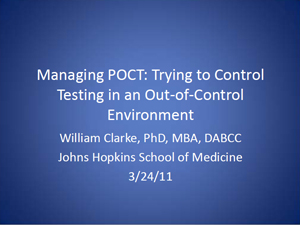
View the slides
I
Listen and watch the recording
Summary: This webinar focused on managing a POCT program in a rapidly
changing environment, with many emerging POCT
applications. We will discuss perspectives on
the rapidly growing numbers of POCT tests
available. We will also discuss challenges and
opportunities that come with getting connected
in the POCT environment.
Objectives: After
viewing this
webinar, you will be able to:
-
Discuss challenges
associated with the rapidly growing number
of available POCT applications
-
Formulate
strategies for efficiently managing a
growing POCT program
-
Identify areas
where POCT connectivity will be useful for
improving efficiency and patient safety
Vendor Sponsors:
 About
the Presenter: Dr. Clarke received his
Ph.D. in Analytical Chemistry from the
University of Nebraska in Lincoln in 2000,
followed by a post-doctoral fellowship in
Clinical Chemistry at the Johns Hopkins School
of Medicine, ending in 2002. In addition, he
received an MBA focused on medical services
management from the Carey School of Business at
Johns Hopkins in 2007. Following his
post-doctoral fellowship, he has remained at
Johns Hopkins, where he is an Assistant
Professor in the Department of Pathology, as
well as the director of both Point-of-Care
Testing and TDM/Toxicology for the hospital.
Dr. Clarke is board certified in Clinical
Chemistry by the American Board of Clinical
Chemistry, and is a Fellow of the National
Academy of Clinical Biochemistry. His research
interests include pharmacogenomics, method
development for TDM, POCT technology
implementation, and the study of outcomes and
medical decision-making in the context of
variability in laboratory measurements. Dr.
Clarke has published 29 papers in journals such
as Analytical Chemistry, Journal of
Chromatography, Clin Chim Acta, and
Annals of Surgery, as well as 24 book
chapters. He is editor of the book
Contemporary Practice in Clinical Chemistry.
Dr. Clarke was the recipient of the 2004 George
Grannis Award from the NACB for excellence in
research and publication by a young
investigator, and also the 2005 AACC TDM/Toxicology
Division Young Investigator Award. He has
received research funding from the National
Institutes of Health, the Van Slyke Society of
AACC, and several in vitro diagnostic companies.
About
the Presenter: Dr. Clarke received his
Ph.D. in Analytical Chemistry from the
University of Nebraska in Lincoln in 2000,
followed by a post-doctoral fellowship in
Clinical Chemistry at the Johns Hopkins School
of Medicine, ending in 2002. In addition, he
received an MBA focused on medical services
management from the Carey School of Business at
Johns Hopkins in 2007. Following his
post-doctoral fellowship, he has remained at
Johns Hopkins, where he is an Assistant
Professor in the Department of Pathology, as
well as the director of both Point-of-Care
Testing and TDM/Toxicology for the hospital.
Dr. Clarke is board certified in Clinical
Chemistry by the American Board of Clinical
Chemistry, and is a Fellow of the National
Academy of Clinical Biochemistry. His research
interests include pharmacogenomics, method
development for TDM, POCT technology
implementation, and the study of outcomes and
medical decision-making in the context of
variability in laboratory measurements. Dr.
Clarke has published 29 papers in journals such
as Analytical Chemistry, Journal of
Chromatography, Clin Chim Acta, and
Annals of Surgery, as well as 24 book
chapters. He is editor of the book
Contemporary Practice in Clinical Chemistry.
Dr. Clarke was the recipient of the 2004 George
Grannis Award from the NACB for excellence in
research and publication by a young
investigator, and also the 2005 AACC TDM/Toxicology
Division Young Investigator Award. He has
received research funding from the National
Institutes of Health, the Van Slyke Society of
AACC, and several in vitro diagnostic companies.